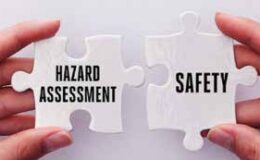By Travis Halsted, Loss Control Consultant
First and foremost, I hope everyone is having a spectacular summer! Whether you are spending time on the water, relaxing and reading a book on your front porch or traveling, I hope that you are all able to enjoy this beautiful Michigan weather. I am not quite sure how it worked out this way, but I find myself scheduling a great deal of my Loss Control visits on the west side of the state this time of year. It must be some kind of coincidence.
With these elevated temperatures, the need to use the air movement fans also rises. The air movement fans have a plethora of different hazards that can cause injuries. Within the first week of July, MTMIC had two injuries directly related to fans. Some of the most common hazards that are found with fans include, but are not limited to:
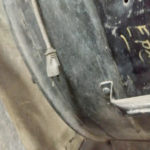 Missing Ground Prong: One of the most common violations with fan plugs is that they are found to have a missing ground prong. This missing ground prong is an electrical hazard and the plug should be replaced by a qualified individual.
Missing Ground Prong: One of the most common violations with fan plugs is that they are found to have a missing ground prong. This missing ground prong is an electrical hazard and the plug should be replaced by a qualified individual.
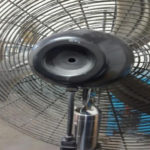 Missing On/Off Switch: A great deal of fans are found with a missing on/off switch. The majority of fans, like the one pictured, have a chain that has been pulled out of the motor. The hazard here is that you are plugging in and unplugging the fan in a “hot” condition. The plug is energized when the employee removes the plug from the receptacle. While an option is to replace the missing chain, some companies choose to install an inline system.
Missing On/Off Switch: A great deal of fans are found with a missing on/off switch. The majority of fans, like the one pictured, have a chain that has been pulled out of the motor. The hazard here is that you are plugging in and unplugging the fan in a “hot” condition. The plug is energized when the employee removes the plug from the receptacle. While an option is to replace the missing chain, some companies choose to install an inline system.
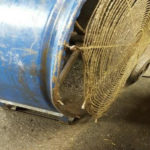 Fan Guarding: In most severe fan related injuries, the cause is often uncompliant/missing fan guarding. To reduce the exposure from rotating fans, all fan blades within 7 feet of the floor should be protected by a guarding having a maximum opening that relates to the distance to the point of operation hazard. This distance can either be found on the MIOSHA website or from your Loss Control Consultant. Guards should be in good shape and properly secured to the fan housing. These screws or fastening devices should be inspected, periodically to ensure that they remain secured.
Fan Guarding: In most severe fan related injuries, the cause is often uncompliant/missing fan guarding. To reduce the exposure from rotating fans, all fan blades within 7 feet of the floor should be protected by a guarding having a maximum opening that relates to the distance to the point of operation hazard. This distance can either be found on the MIOSHA website or from your Loss Control Consultant. Guards should be in good shape and properly secured to the fan housing. These screws or fastening devices should be inspected, periodically to ensure that they remain secured.
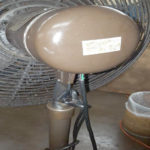 Exposed Wiring: In many cases, the wiring on the power cord is exposed at the entry point of the motor and/or at the plug end. This exposed wiring is an electrical hazard. Many facilities will utilize electrical tape to repair the exposed wiring. Unfortunately this is not an approved repair as per MIOSHA. The exposed wiring (green/black/white) must be covered by the outer insulation. The insulation should be secured back into the fan motor and the insulation should be secured back into the plug end or the plug should be replaced.
Exposed Wiring: In many cases, the wiring on the power cord is exposed at the entry point of the motor and/or at the plug end. This exposed wiring is an electrical hazard. Many facilities will utilize electrical tape to repair the exposed wiring. Unfortunately this is not an approved repair as per MIOSHA. The exposed wiring (green/black/white) must be covered by the outer insulation. The insulation should be secured back into the fan motor and the insulation should be secured back into the plug end or the plug should be replaced.
 Finally, the movement of the fans is also something else that needs to be considered when talking about hazards. As most styles of these fans are portable, it is vital to consider how the fans are moved and when they are moved. For instance, a recent injury happened because the employee was moving the fan while the fan was plugged in and the fan was on. The employee’s fingers went between the guarding on the fan and the employee was subsequently injured. This points to a need to ensure that the fan is off, at a minimum, before it is moved. Ideally the fan would be unplugged before the fan is moved. Furthermore, after a fan has been running for an extended period of time, the motor can become hot. When the fans are moved, employees often use the motor as a place to put their hand during movement. This hand placement could cause a burn injury. It would be beneficial to unplug the fan and let the motor cool down if it is found to be warm to the touch. As these fans can often have some substantial weight to them, it would be a great idea to have a minimum of two people to move the fans. Ideally the use of a lift truck or other lifting device would be used, but if employees manually move the fan, they should move it in a team lift.
Finally, the movement of the fans is also something else that needs to be considered when talking about hazards. As most styles of these fans are portable, it is vital to consider how the fans are moved and when they are moved. For instance, a recent injury happened because the employee was moving the fan while the fan was plugged in and the fan was on. The employee’s fingers went between the guarding on the fan and the employee was subsequently injured. This points to a need to ensure that the fan is off, at a minimum, before it is moved. Ideally the fan would be unplugged before the fan is moved. Furthermore, after a fan has been running for an extended period of time, the motor can become hot. When the fans are moved, employees often use the motor as a place to put their hand during movement. This hand placement could cause a burn injury. It would be beneficial to unplug the fan and let the motor cool down if it is found to be warm to the touch. As these fans can often have some substantial weight to them, it would be a great idea to have a minimum of two people to move the fans. Ideally the use of a lift truck or other lifting device would be used, but if employees manually move the fan, they should move it in a team lift.
In conclusion, knowing the hazards of this type of fan is the first step to ensuring workplace safety. A periodic inspection and cleaning of the fans is a great first step to ensuring that your fans are safe and in proper working order. Please remember that the Loss Control Department is here to help if you have any questions. I hope you are all having a safe and productive 2018.





